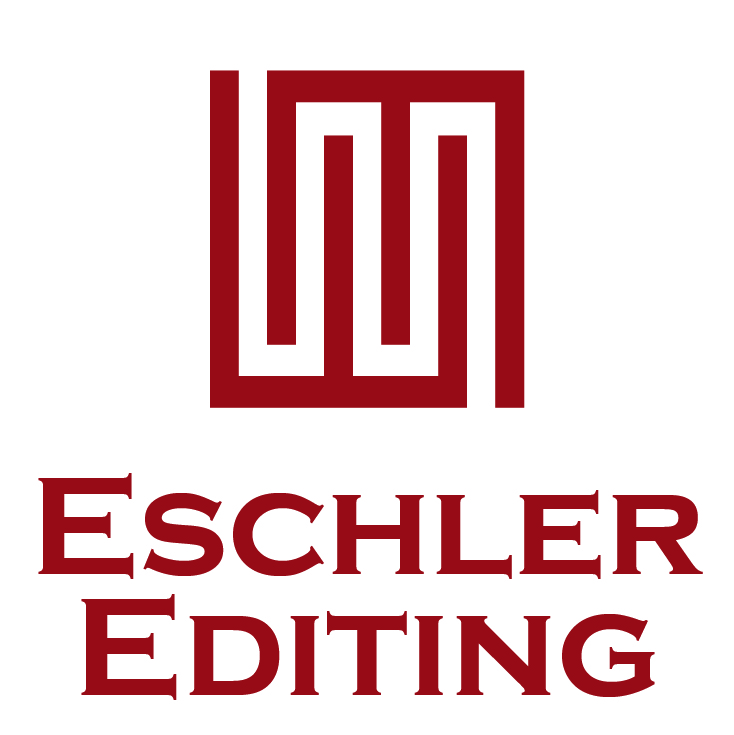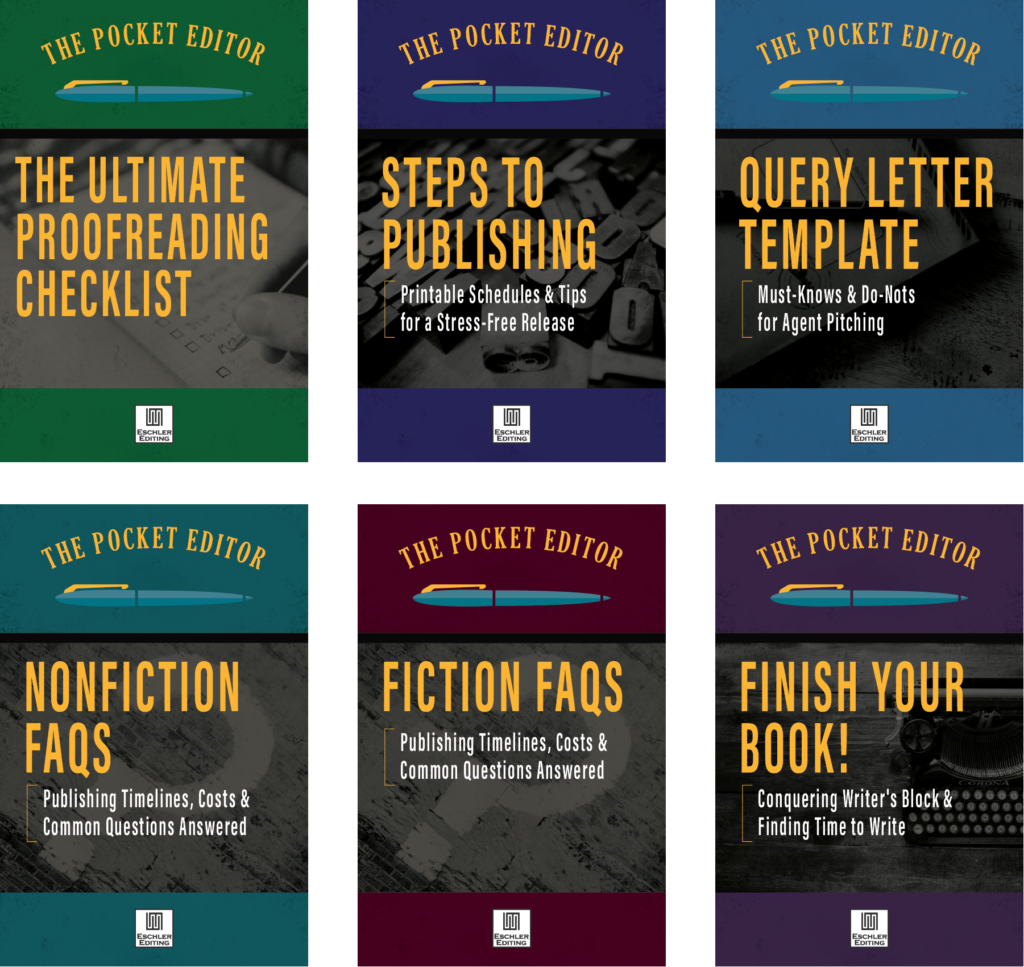Or, Letting Angst Go So Your Book Can Flow
by Angela Eschler & Sabine Berlin
Happy 2024! It’s a new year, and that means new goals. Whether it’s losing those extra Christmas pounds, flossing daily, or increasing the number of books you read this year, we wish you the best of luck. But there’s one goal we’re hoping you have more than just a little luck with. You know the one. The one that most likely brought you to our site in the first place.
New Year’s Goals 2024
1. FINISH A BOOK!!!!
Maybe it’s your first book, maybe it’s your seventh. Whatever the case, we’re here to help. So our first piece of advice on getting you where you want to be should involve planning, outlining, or correct punctuation. Right?
Wrong.
1. Let Go of Perfection
If your goal is to write a book this year, then the best advice we can give you is to stop being so critical and let the book inside you come out. Write badly. Yes, this is advice coming from editors!
Michelangelo put the creative process simply: “I saw the angel in the marble and carved until I set him free.” Sounds easy. But you might think, I’m no Michelangelo! It will take years to make my book perfect. If you believe that, then your novel will never be done, and it certainly won’t be perfect. Maybe there’s something to Michelangelo’s simple take.
In The Artist’s Way, Julia Cameron shares this beautiful truth: “Perfectionism is a refusal to let yourself move ahead.” If you begin your book by trying to make it perfect, you will never accomplish your goal. Instead, let your creative mind open.
This letting-go-of-perfection applies to your whole writing career, not just one book. You’ve heard of the 10,000-Hour Rule*? No one, even the innately talented, starts out in their first hour of practice as the J.K. Rowling that we all know today. We try, we fail, we try again. Every step along the path is a learning experience that gets us just that much closer to a longed-for destination. Cameron aptly applies this metaphor to our artistic selves:
The horse is very talented but it is also young, nervous, and inexperienced. It will make mistakes, be frightened by obstacles it hasn’t seen before. It may even bolt, try to throw you off, feign lameness. Your job, as the creative jockey, is to keep your horse moving forward and to coax it into finishing the course.
Just keep a steady course despite the imperfections. Allow yourself to be okay with needing practice—and with how much time practice requires.
2. Redefine Your Goals
Our next tip, about motivation and completion, comes from goal-setting guru Danielle La Porte. She explained in an online interview that, like most of us, her goals often ended in compromised self-esteem when she failed or short-lived and anticlimactic excitement when she succeeded. So much struggle and stress for so little emotional reward! While she wrestled with whether to let go or continue the constant reaching, a wise friend told her, “You’re always going to have desires. There’s always going to be a reaching. You just have to ask yourself if you’re being pushy about it.”
She realized all her pushing wasn’t really about the objectives, it was about the feelings she was trying to have at the end of the effort. And that’s much easier to control than whether every aim is met. How do you get to the feeling and skip all the pressure and pushing? Start backward. Instead of starting with your goals and do-or-die timelines, start with the desire—what you want to feel at the end of the goal—and ask what you can do that day to have that feeling. (Sometimes the answer is completely unrelated to your original goal!)
Given that you can’t control every factor involved in the success of your writing career, the key is to get to the deep core desires/feelings you’re looking for, not the external ones—those dependent on validation from outside ourselves. Because no matter what success you achieve, there is always something else to strive for immediately after—the next step up in that structure of externally defined success.
So consider why you’re drawn to writing. Are you excited every time you think of your new book or is there some anxiety, pressure, or discouragement hovering? Perhaps examining your goals in this new light will allow you to shift the energy around why you’re writing, to do it merely out of love for your message or story! And chances are that focus on what makes you passionate will propel you toward those long-awaited moments of accomplishment. Before you know it, that unsure but talented horse Cameron mentioned will also be an experienced one, and you’ll find that tomorrow you may be a bit more skilled, more efficient, less insecure, and more fulfilled.
Bonus: Overcome resistance.
Resistance is a major negative force that can hold you back from from fulfilling your dreams. Watch this inspiring video on how author Steven Pressfield overcame resistance, self-sabotage, and self-doubt (and how that’s more important than talent!).
The Take-Home
So ease off the self-pressure. Define success from the inside out and give yourself permission to be a learner. Now, look at your goals. You want to write a book because creativity feels great, because your message is important, your story amazing, and—for us word nerds—compelling strings of nouns, verbs and, yes, even adjectives, make you want to cry from joy or “sound your barbaric yawp!”**
So write it. You’ve taken the first step, you’ve made the goal. Write like you mean it. Write the first chapter and then write the next. Don’t look back, don’t look down—look ahead. Let your unchecked creativity lead you to the end of your book. No stops, no U-turns. In other words, let the angst go so your book can flow … And will you succeed? As Dr. Seuss says: “98 and ¾ percent guaranteed.”***
Do This Now
- Get a copy of Cameron’s The Artist’s Way
. It will get you in touch with your creativity, help eliminate insecurities and writer’s block, and change your perspective on being a writer. For a shorter boost of inspiration, you could try Ray Bradbury’s Zen in the Art of Writing
.
- If you want to go deeper and really understand reverse goal setting, you can watch Danielle LaPorte’s full interview here.
- Don’t be perfect! The ancient Persians knew perfection wasn’t always the goal; they put flaws in their rugs so as not to offend the gods. You don’t want to offend the gods!
- Get really effective with your word count when you’re just pumping out the first draft. You can write 25k words in three days by using the tips here.
*The 10,000-Hour Rule is from Malcolm Gladwell’s Outliers (about success) and is based on a study by K. Anders Ericsson.
**From Walt Whitman’s poem “Song of Myself.”
***Oh, the Places You’ll Go! by Dr. Seuss
Obviously, for us the best way to let creativity loose is by giving ourselves permission to write badly and just focus on the subconscious flow. And the surprise is that not worrying about it usually produces the best writing! Your turn to share advice. Figured out how to turn off the pressure and still meet your goals? Do Tell…
______________________________________________________________________________________________________________

Angela Eschler, founder of the award-winning Eschler Editing, has nearly twenty years of experience in the publishing industry, including a near decade working in-house at traditional publishers. She now works as a freelance editor and industry coach for authors, editors, publishers, and other organizations and has edited nearly a thousand manuscripts from diverse genres. A published author herself (inspirational works for women), Angela’s work has been featured on television, radio, and in documentary film. As a certified word nerd, she loves connecting with writers and readers of all sorts.
 Sabine Berlin is an avid reader of everything from Asimov to Zusak. She has a degree in history, writes YA fiction, and was selected to attend Orson Scott Card’s Literary Bootcamp, where she studied writing and critiquing. She has been with Eschler Editing since 2012. She invites you to visit her blog.
Sabine Berlin is an avid reader of everything from Asimov to Zusak. She has a degree in history, writes YA fiction, and was selected to attend Orson Scott Card’s Literary Bootcamp, where she studied writing and critiquing. She has been with Eschler Editing since 2012. She invites you to visit her blog.





I love this! Thanks for the dose of inspiration!
Great article! And much-needed right now. Thank you Sabine for helping me remember it’s okay to write badly in my first couple drafts.
In so glad to know there are other authors out there as prone to angst and self-destructive pressure as me. I can attest to the truth of this approach… And you made it sound so doable. Thanks!
This is so very, very timely in my life. I absolutely needed to read this. I haven’t been a New Year’s resoluter for years, but this year a writing buddy and I have committed to set writing goals and hold each other accountable (though I’m interested to see what either of use mean by “hold accountable”– we live 500 miles apart and he can’t exactly withhold dessert if I don’t write my 30,000 words per month, now).
I’ve known for a while that I suffer from perfectionist paralysis, but haven’t known quite what to do to overcome it– “just let it go” is hardly helpful. Thanks for some more concrete advice and for pointing me (us) to some good resources.
And thank you for the permission to write badly! My goal of manuscript-by-year’s-end may very well deliver up an unreadable disaster by next December, but it will be finished (which is not the same as complete). It’s good to be reminded of the importance of process and of just *doing*.
Perfection paralysis is just the way to put it. I think we all need this reminder to “let it be…” (Anyone singing with me?) Co-writing this article was a great reminder for me. I’m reorganizing my goals and self-expectations as we “speak”!
Good luck with all your goals! Sarah and Heather…You can do it!!! Adrianne, just the fact that you have a writing buddy is a start. In my writer’s group we have upped the ante to say if you don’t write you pay. All the money goes into a pot for a party at the end of the year, but maybe you and your buddy could just pay each other, or have to put all the money you pay at the end of the year toward a charity, maybe something that buys books for underprivileged kids or something. Whatever you do, good luck getting your 30,000 words a month. That is an awesome goal!
I think the other part of goal setting is allowing yourself to tweak or adjust them as life happens. If you’ve been involved in building something, timelines can and are adjusted. If you are rigid, then when life gets crazy you force yourself to fail instead of helping yourself succeed.
I love this article! This is how I was able to finish Nanowrimo this year. The problem is going back and making edits for me. I guess I just need to remember the first tip, not to be a perfectionist. I understand that it may take many rewrites to get the story where I want it and I just need to remember that it may not be perfect on the second rewrite or the third or however many versions after, but I just need to start where I am and move forward. Thanks for the tips!
As a comment on point one, you could say perfectionism is a form of procrastination.
As a comment on point two, take a tip from sports psychology. If you have had a writing success in the past, use how that moment felt to motivate yourself. Analysis of that feeling could also help you define why you write.
Very good points! “Perfectionism is a form of procrastination.” That’s meme-worthy! Thank you for your comments.